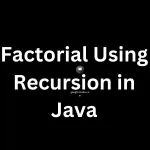Factorial Using Recursion in Java. The factorial calculation is a fundamental mathematical operation frequently encountered in various programming scenarios.

Table of Contents
The factorial of a non-negative integer n is denoted as n! and is defined as the product of all positive integers less than or equal to n. For instance, 5! (read as “five factorial”) is calculated as 5 * 4 * 3 * 2 * 1, resulting in 120.
In Java, factorial calculation can be efficiently implemented using recursion, a programming technique where a method calls itself to solve smaller instances of a problem until it reaches a base case. Let’s explore how recursion can be employed to compute the factorial of a number in Java.
Recursion and Factorial Calculation
Recursion involves breaking down a problem into smaller, similar sub-problems until reaching a base case, which doesn’t require further recursion. In the case of factorial calculation, the base case occurs when the value n reaches 0 or 1. At this point, the factorial is known and equal to 1.
Factorial Calculation Using Recursion in Java
Below is a Java code snippet demonstrating how recursion can be utilized to calculate the factorial of a number:
package com.gangforcode;
public class FactorialUsingRecursion {
// Recursive method to calculate factorial
public static int calculateFactorial(int n) {
// Base case: factorial of 0 or 1 is 1
if (n == 0 || n == 1) {
return 1;
} else {
// Recursive call to calculate factorial of (n - 1)
return n * calculateFactorial(n - 1);
}
}
// Main method to demonstrate factorial calculation
public static void main(String[] args) {
int number = 7; // Example: Calculate factorial of 5
int factorial = calculateFactorial(number);
System.out.println("Factorial of " + number + " is: " + factorial);
}
}
Output

Explanation of the Java Recursion Code for factorial
calculateFactorial(int n): This method takes an integernas input and calculates its factorial using recursion.- Inside the method, it checks for the base case where
nequals0or1, returning1to terminate the recursion. - If
nis greater than1, the method recursively calls itself, passingn - 1as the argument until it reaches the base case. - The result is obtained by multiplying
nwith the factorial ofn - 1, continuing until the base case is reached.
Recursion is a powerful technique in programming that simplifies problem-solving by breaking down complex tasks into smaller, manageable ones. In the case of factorial calculation, recursion provides an elegant and concise way to compute factorials by leveraging the concept of smaller sub-problems and base cases.